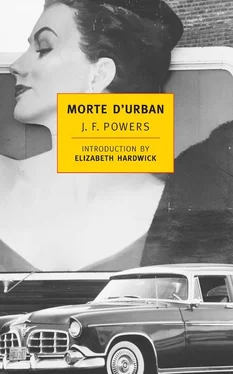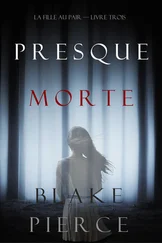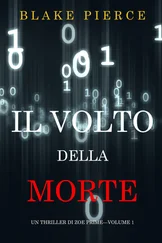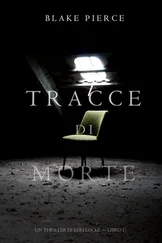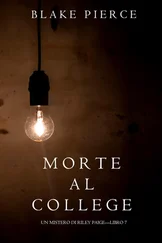The house looked and felt better to him in August, and his room faced the lake. Lots of peace and quiet and no outboard motors, for Mrs. Thwaites owned all the land around the lake. In the morning, Katie drove him to town, to the Cathedral, where he said Mass, and then she drove him back to the house. He spent most of the day in his room, in a Morris chair, in the company of the great historians from the library downstairs, but sometimes he could be seen moving slowly about the grounds, under the great oaks, reading his office, and wearing his cassock — he had decided against slopping around in slacks while there. Once he saw Mrs Thwaites watching him from one of her windows, and tried to get a squirrel to take a green acorn out of his hand, but it wouldn’t, nor would a dove. In the afternoon, he had tea with Mrs Thwaites in her room, with the sets on. On the first day of his stay, they got on the elevator, and she showed him her bomb shelter, which was well stocked with food and water, games and reading matter, walls and ceiling done in soft pastel colors approved by psychiatrists, and plenty of closet space.
For the next three days, though, he didn’t see Mrs Thwaites except at tea, with the sets on. Mrs Thwaites still preferred television to anything else, it seemed, unless it was dominoes with Katie. (Father Urban wasn’t asked to play.) They never met at table, but ate all their meals (just so-so) in their rooms, off trays delivered by Katie or by an old woman who said she worked for Mrs Thwaites in the summertime, “when she entertains more.” This, though Mrs Thwaites did have some card-playing friends, seemed to mean visits from her daughter Sally and Sally’s husband. Dickie, who had wound up his affairs in Ostergothenburg, was living and working at home again but was away just then. His little Porsche wasn’t in the coach house, where Father Urban looked for it, and saw a red pony cart, an electric car (on blocks), and a square piano, much like the one his mother had played.
And then the weather warmed up, got hot, in fact, and stayed hot for about a week. Earlier in the season, Father Urban had experienced the heat of summer in Minnesota, but this was worse, like August in Indianapolis or St Louis. At night, tiny bugs that no screen could stop, and large moths that came from nowhere, interfered with his reading. He saw more of Mrs Thwaites during this hot period. There were late-afternoon cruises on “Tilly,” the launch, an ancient but sound craft with a faded brown-and-white striped canopy. Mrs Thwaites, in her wheelchair, gazed out at the path of bubbles in the water, and Father Urban stood, or sat, beside her, and Katie, at the helm, kept within easy reach of the shore (“In case of a storm,” Mrs Thwaites said). Once around the lake, which was shaped like an egg, and flecked with islands and reef-like rocks, was always enough for the old lady, and took about an hour. They talked against the soft music of the launch’s motor — talked mostly of Mrs Thwaites’s family.
On the first of these excursions, the old lady spoke (as she hadn’t before in Father Urban’s presence) of her dead husband. Where was Andrew spending eternity? “Pray for him, ma’am.” Andrew had been a great enemy of the Church, like St Paul, but there had been no road to Damascus for Andrew. “Pray for him, ma’am — and I’ll do the same.” The old lady was also worried about Dickie. Was it well for the boy to be out in the world? “There’s much good to be done in the world, ma’am.” But wouldn’t he be better off in a cloister, a boy like him? “Not necessarily, ma’am. By the way, I had a note from Father Excelsior today. He sends his best. Where is Dickie now, by the way?” The old lady looked unhappy and said that Dickie was away. Away. That was all Mrs Thwaites would say.
This was unfortunate for Father Excelsior who firmly believed that editor and publisher should work together and try to understand each other’s problems. One of Father Excelsior’s problems was getting out a prospectus for, and not knowing what to expect from, Eight Seasons Editions (under which imprint certain titles of the Millstone Press would be issued, so Publishers Weekly had reported back in May). There had been a certain amount of correspondence between publisher and editor since May, but lately this had ceased on the latter end, and now, far call from the ideal, publisher couldn’t even find editor. Publisher had last heard from editor in July, and enclosed a copy of the communication received then, a communication to the effect that Father John had agreed, under terms to be arranged later, to prepare a scholarly children’s edition of Le Morte d’Arthur , by Sir Thomas Malory. That was all Father Excelsior knew. Could Father Urban help him? No, it seemed not. Dickie was just away.
There was a tower on one of the little islands they passed on their cruises, a battlemented tower of rough red granite, one wall of which, windowless, with iron rungs set into it, and a diving board at the top, rose out of deep water like a cliff. “Sally’s castle,” Mrs Thwaites said the first time Father Urban saw it. “Andrew had it built for her when she was twelve.” The word cut over the door of the tower, “Belleisle,” probably came from some romantic tale, Mrs Thwaites said. Sally had been a great reader. Mrs Thwaites, wife and mother, worried a great deal about Andrew and Dickie, but not as she did about Sally and herself.
Father Urban, listening as to a royal complaint, had a vision of life in late medieval times, when nothing and nobody was for sure, when kings and prelates were selling out right and left. They were on a Highland loch, the old queen with her blowball of white hair, the rosy-cheeked Irish girl ever true to her queen and Pope (as her queen hadn’t always been), and the tall handsome gentleman whose darkness of skin and subtle manner gave him away as Spanish — a traveler lately arrived from the Continent on business of church and state, the success or failure of which would be revealed in the histories, atlases, and stud books of the future. In this vision of Father Urban’s, which, of course, derived from his current reading, there were flaws — the putt-putt of the royal barge, the black sunglasses worn by the queen, the Spaniard’s cigar — but the conversation rang true.
“I can see myself in her, Father.”
“I’m told she favors you, ma’am.”
“I was out of the Church myself for a time — does that surprise you, Father?”
It did not, of course, since Monsignor Renton had said as much, and more. “You might say St Peter himself was out of the Church for a time, ma’am. Not a very long time, it’s true. The important thing is he came back in and went on to become our first pope.”
Mrs Thwaites made no reply. It was the last day of Father Urban’s stay, and they’d just sailed past Sally’s castle.
“Pray for her, ma’am.”
“Father Udovic thinks I should make a pilgrimage.”
“You’ve talked this over with him then?”
“Yes.”
“Lourdes?”
“Yes. Father Udovic’s leading a tour next summer. When I was there some years ago, I said I’d never go again, but maybe I will. I understand the accommodations are better now.”
“So I understand.”
“I’d be grateful, Father, if you’d stay another day or two. Sally and Norris will be here tomorrow afternoon.”
“Ah, ma’am, these things are best left to God. But since you ask it, yes, I’ll stay.”
The next morning, after Mass, Father Urban ran into Monsignor Renton and told him that the Hopwoods would be arriving from Minneapolis that afternoon.
“Sally?” said Monsignor Renton. “She’s the best of a bad lot.”
Father Urban asked what Mr Hopwood was like.
Читать дальше
